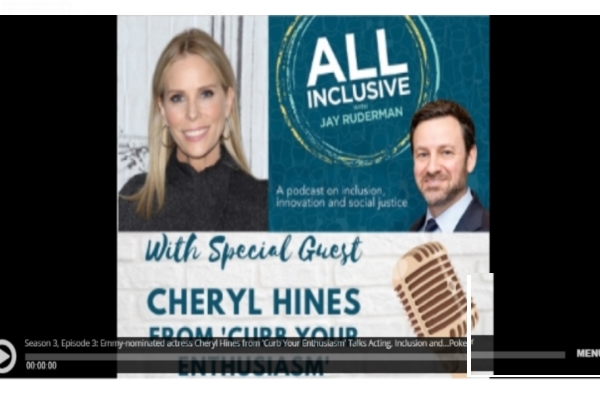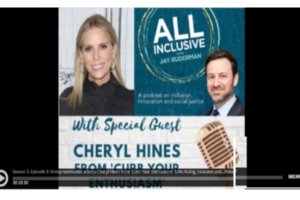I have so many wonderful Jay Rudermanisms in my head. Among my favorites, which I have put in my own words and regularly take to heart:
“We are all only temporarily nondisabled”
“If you go around a table at an event and speak honestly, we realize we all have close connections to disabilities—through family, friends, etc.”
“Inclusion is a Jewish continuity (and human rights) issue—if a person with a disability does not feel welcomed in a synagogue, you lose not only that person, but his or her entire family.”
I am so appreciative to Jay Ruderman for his wisdom and leadership in the area of disabilities inclusion. Jay is President of the Ruderman Family Foundation, which focuses on the inclusion of people with disabilities worldwide (as well as educating Israeli leaders on the American Jewish community). Jay and the Foundation have been working hard recently on the issue of authentic representation in Hollywood—where people who actually HAVE disabilities portray people on shows with disabilities. [https://rudermanfoundation.org/white_papers/the-ruderman-white-paper-on-authentic-representation-in-tv/]. Jay is also the host of the podcast, “All Inclusive with Jay Ruderman,” now in its 3rd season.
The current podcast features Jay’s interview with Cheryl Hines, wife of the one-and-only Larry David on “Curb Your Enthusiasm.” [The podcast is available on many platforms with a written transcript here:
Jay notes that he met Cheryl, as well as Larry David and “Curb” cast member, Ted Danson at a pre-pandemic event in Beverly Hills honoring screenwriters and directors, Peter and Bobby Farrelly, for their work for inclusion of people with disabilities in their films. Hines has particular sensitivity to issues of disabilities and inclusion, and to the principle of authentic representation—she has a nephew with cerebral palsy.
Hines reports, “I have a nephew who has cerebral palsy and he’s been in a wheelchair his whole life and his speech is not great, but I can understand every word. So I think there’s an interesting thing that goes on with people, especially that involves speech, some sort of disability that might impact your speech, the people around them can hear every word and understand it perfectly. And then somebody new comes in and it sounds like, ‘Oh, I can’t possibly hear what this person’s saying’…I think it’s very important for the industry to hire people with disabilities because it’s an authentic way to really see who other people are. So someone with a disability like cerebral palsy, if you hire somebody who has cerebral palsy like RJ Mitte in Breaking Bad. Here you have a great actor who’s playing somebody who has cerebral palsy who has cerebral palsy. So it’s a very authentic look at it and it’s not somebody’s interpretation of it, it’s just an actor playing a role.”
There have been strides in the industry. Hines notes, “I think they (ABC and “Dancing with the Stars”) have done a very good job introducing the masses to someone who only has one leg, who’s an amazing dancer, somebody who can’t hear, who’s an amazing dancer. And it’s been fun to watch how much people around the world, around the country connect with that person. Most people haven’t had the opportunity to watch somebody who only has one leg, dance or who’s deaf, dance…So I think it’s a good indicator to the industry that people connect with this and people want to understand it, want to see it, want to explore it. Clearly if so many actors have been winning awards for their portrayal of someone with a disability, there’s an audience out there who wants to see the story of this person with a disability. So what better way to do it than somebody with that disability. I think you’re right, I think we’re ready for it. We want to see it.”
Hines playfully suggests that she continues to grow accustomed to working with differences—through her work with Larry David himself! “Larry is, as you can imagine, a very smart person. And he’s so great because he knows what’s funny about himself. He knows that because he hates social rules, he knows that that’s funny to other people, although in real life he hates social rules. So it’s pretty great that he can harness it basically and do it on the show. In real life, he wouldn’t actually cross some of the lines he crosses on Curb, but he also says, that’s why he does it, that’s why he does the show. So he can because that’s how he would like to act.” Jay then recounts a funny interaction with David, “I remember when I went to shake his hand, he’s like, ‘I haven’t shaken a hand in six weeks and I’m not going to start right now.’ Hines replies, “Yeah. But that’s what I like about him. He’ll be very honest with you. “Do you want to have lunch?” “No.” “Oh, okay. Well then I will talk to you later.” “Yeah. Or not.”
Jay and Cheryl remind us that we all know—and should continue to get to know and learn from people with disabilities. Appreciating everyone’s differences and gifts and including everyone will make the world a better, kinder place.


